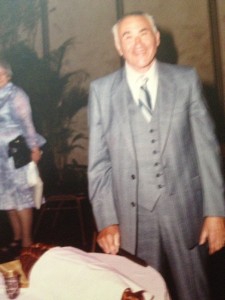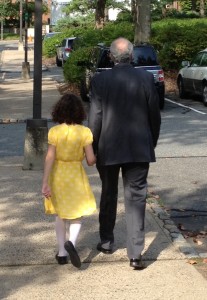Whose Gen-X Judaism?
 People are talking about “A Portrait of Jewish Americans: Findings from a Pew Research Center Survey of U.S. Jews.” I’ve tried to keep up with what they are saying, refraining, for the most part, from commenting. (There are many blessings that accompany having a full-time job; in my case, the luxury of focusing quickly, thoughtfully, and in writing on matters of great personal interest isn’t one of them.)
People are talking about “A Portrait of Jewish Americans: Findings from a Pew Research Center Survey of U.S. Jews.” I’ve tried to keep up with what they are saying, refraining, for the most part, from commenting. (There are many blessings that accompany having a full-time job; in my case, the luxury of focusing quickly, thoughtfully, and in writing on matters of great personal interest isn’t one of them.)
So, over the past several days, I’ve read and listened to others. I’ve found myself agreeing with plenty that some commenters, including Rabbi David Wolpe and Jane Eisner, have had to say. But when I read Elissa Strauss’s “Give Us Our Gen-X Judaism,” disagreement—and a sense of depression—ensued.
And this troubled me, not only because Strauss and I have had numerous agreeable exchanges in the past (even if we haven’t ever met face-to-face), but also because, unlike Wolpe or Eisner, I’m actually part of the cohort on whose behalf Strauss is ostensibly speaking, those “Gen Xers” who were born, as the Pew survey indicates, between 1965 and 1980. And “our” Gen-X Judaism, at least as outlined in Strauss’s post, is definitely not mine.
As a writer, I knew enough to wonder at the outset if the article had been given a headline that Strauss didn’t contribute. After all, Strauss’s first paragraph concludes with a statistic from the Pew survey pertaining to Jews born after 1980 (technically “Millennials,” not Gen Xers). Indeed, Strauss seems to focus less on any discrete “Gen-X Judaism” than on an amorphous Jewish cohort of “young adults” who lack “a pre-existing Jewish background or community.” This weekend, on Twitter, Strauss affirmed that the headline wasn’t her choice, and that’s important.
Still, Strauss envisions a wave of younger Jewish folk who are encountering experiences like her own. She was, she says, “consistently turned off by the Jewish community until [she] finally, found my way in.” Her path of entry was an innovative program called LABA, which she describes as “a culture laboratory and non-religious house of study at the 14th Street Y” in Manhattan. (Strauss is now LABA’s co-artistic director and journal editor, and in her Forward piece she calls for a proliferation programs of its kind.)
Personally, I have less faith in LABA’s expansive potential. My sentiments are perhaps as individually-grounded as Strauss’s. In simplest terms, for me, LABA has proven to be exclusionary. Strauss writes that she “was invited to partake”, but my application a few years back was rejected; notwithstanding the thick skin I’ve developed over time thanks to all of the rejections that accompany most writers’ lives, I’ve never re-applied.
But let’s not digress from the larger point. If there are so many young Jews who simply never experienced a meaningful Jewish upbringing and education; who have never sensed something akin to holiness—yes, holiness—as they recite prayers or listen to a cantor chanting liturgy; who have never considered themselves part of Klal Yisrael; who have entered their 30s and beyond with “no idea, really zero, about the richness and complexity of the Jewish canon,” then Strauss is partially correct, and the “institutional powers” whom she beseeches must consider some creative approaches to drawing them in at this late date.
But, please, let them not follow Strauss’s prescription too closely! For Strauss is clear on what she found so unappetizing in her earlier efforts to engage with her Jewishness before LABA: “Oy. Basically everything all the big philanthropists push on us. Zionism, [H]olocaust remembrance, Tikkun Olam (I am all for volunteer work, but was never convinced that it should be done in a Jewish context) and boring Friday night services at allegedly progressive synagogues.”

Whoa. I may share some of Strauss’s discomfort with tikkun olam: I’m uncomfortable in Jewish groups where tikkun olam is the sole raison d’être, and I am frankly horrified by the prospect of tikkun olam projects supplanting (rather than complementing) the study of Hebrew, Torah, and Jewish history in preparation for Bar/Bat Mitzvah. Tikkun Olam is one ingredient in my Jewish identity, and I love the ways my own home congregation (whose Friday night services I attended regularly when growing up and where I return several times each year) incorporates it into the fabric of congregational life (one example from recent weeks: the annual food drive that ended on Yom Kippur). But as Strauss and others have pointed out, “repairing the world” is not unique to Jews or Judaism.
But the dismissiveness with which Strauss treats Zionism and Holocaust remembrance, in particular, hits me in the heart. As Jews, we are commanded to remember—Zachor—and as Jews born a full generation after both the end of the Holocaust and the realization of the Zionist dream, we Gen Xers have a special duty to know and transmit both the greatest tragedy to befall our people in the twentieth century and its greatest triumph.
As a grandchild of Jewish refugees from Nazi Germany, it seems that I’ve always known something about the Holocaust, and I have spent decades, literally, absorbing its history. I consider it one of my own personal and educational failings that it is only now, in my 40s, that I am acquiring a fuller knowledge of the history of Zionism as well. (LABA may have rejected my application, but thankfully the Tikvah Courses didn’t. I’m also a pretty avid reader and eager participant in community offerings that are open to all, so I keep educating myself on my own, stymied more by time constraints than by anything else.)
I’ve always considered myself fortunate to have grown up in a family that became more “religious” after joining a Reform congregation when I was nine years old, circumstances that I outlined in an essay back when I was 20. After reading Strauss’s essay, I’m even more grateful for that background. It pains me that many fellow Gen Xers have apparently reached adulthood (or, for those of us closer to the 1965 demarcation, middle age) as disconnected from Judaism as Elissa Strauss suggests she was in her pre-LABA life.
But above and beyond anything that can be done for Gen Xers at this late date, my plea to the “institutional powers that be”—and maybe to some higher power—is both more simple and more complex. It’s a wish for more Jewish children to be raised in homes like the one in which I grew up and which I see so many of my close Gen-X family and friends providing for their children. That is to say, it’s a plea for more Jewish children to grow up recognizing early on that being Jewish—religiously and otherwise—is a rich and rewarding experience.
This may make me more sympathetic to Jewish programming and initiatives designed especially for parents and young families than might seem personally relevant (I’m single and child-free). It may inspire me to try to contribute to the education of younger Jews in other ways. Because even if I have no children of my own, the sustenance of Jewish religion and identity “from generation to generation” matters to me. A lot.

Beautiful post, Erika.
Thanks, Helen. Very much appreciated.
I had read a lot about the Pew study last week, but not Ms. Strauss’s post until you pointed it out.
My biggest issue about the whole idea that there is one single “Gen-X Judaism.” I can’t even imagine boiling down our generation into a single form of our culture/religion/whatever, and my experience is so totally completely different than Ms. Strauss’s that it’s mindboggling. Even if she didn’t select the title, writing as if she represents all of us Gen-Xers was probably a mistake on her part.
We’re talking about a generation that has both seen a huge increase in Orthodox practice and a huge increase in assimilation. There are Jews who feel G-d’s presence strongly in everyday life, and those who either don’t believe in Him or find Him completely irrelevant. There are other strong trends in opposite directions, as well as the typical variations in individual experience and practice.
However one wants to label my two children, born 1977 and 1980, they are both active participants in their respective synagogues, one Reform and the other Modern Orthodox. While they were raised in a “religious” Reform household and had Jewish education through confirmation, I am convinced that one of the biggest positive influence in their Jewish lives were the summers they spent at Jewish camp. Study after study has shown that young adults who attended Jewish summer camp are not only more likely to have Jewish homes and raise Jewish children, but also to become Jewish professionals.
@Rebecca: As always, I’m grateful for your forthright and thoughtful comments.
@Maggie: I’m so glad you mentioned the camp contribution. It has come up in several offline conversations that I’ve had this weekend. And it’s connected with what I’ve mentioned at the end, about supporting parents/families, since I’m aware of the availability, in some cases, of stipends to help kids attend.